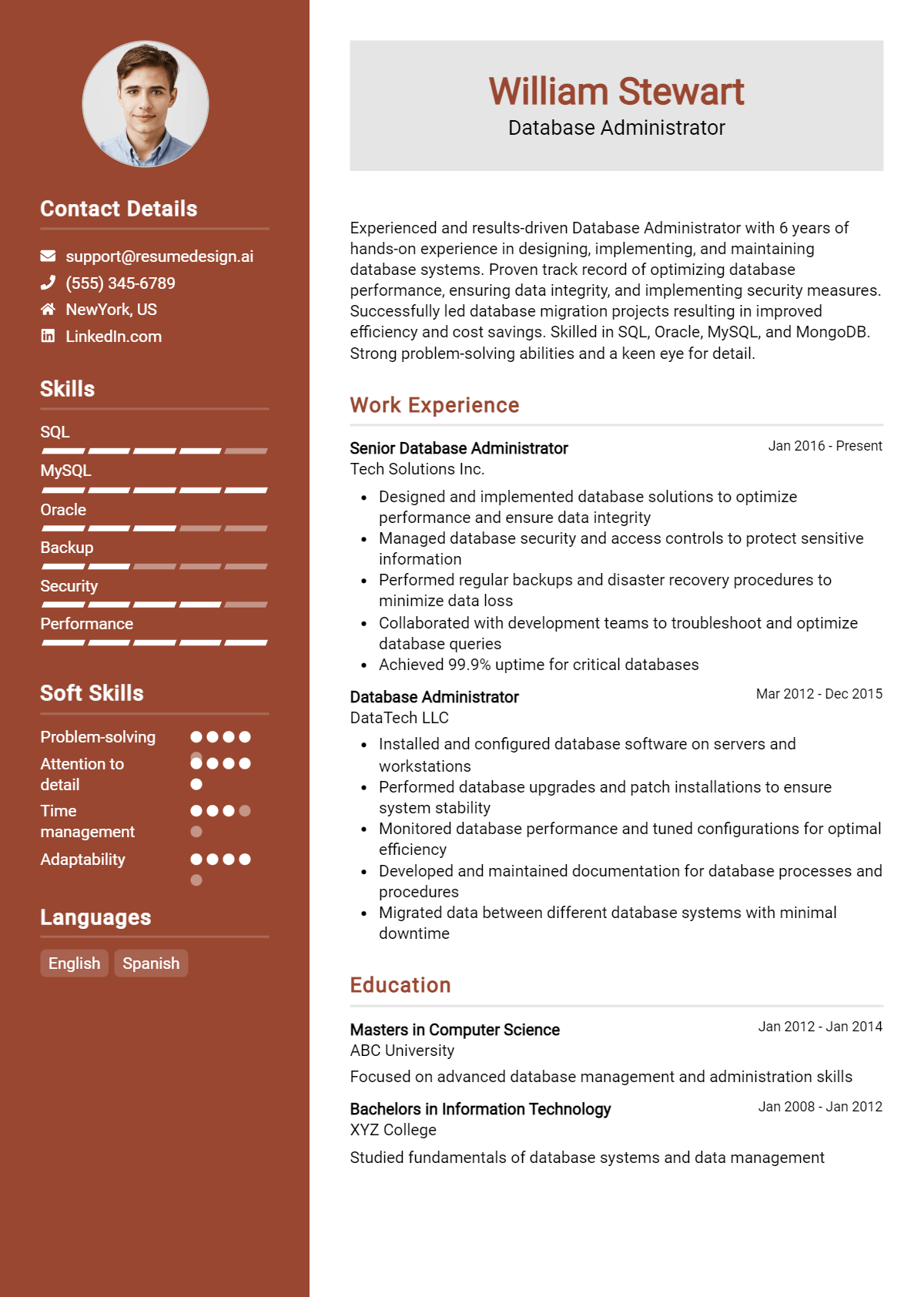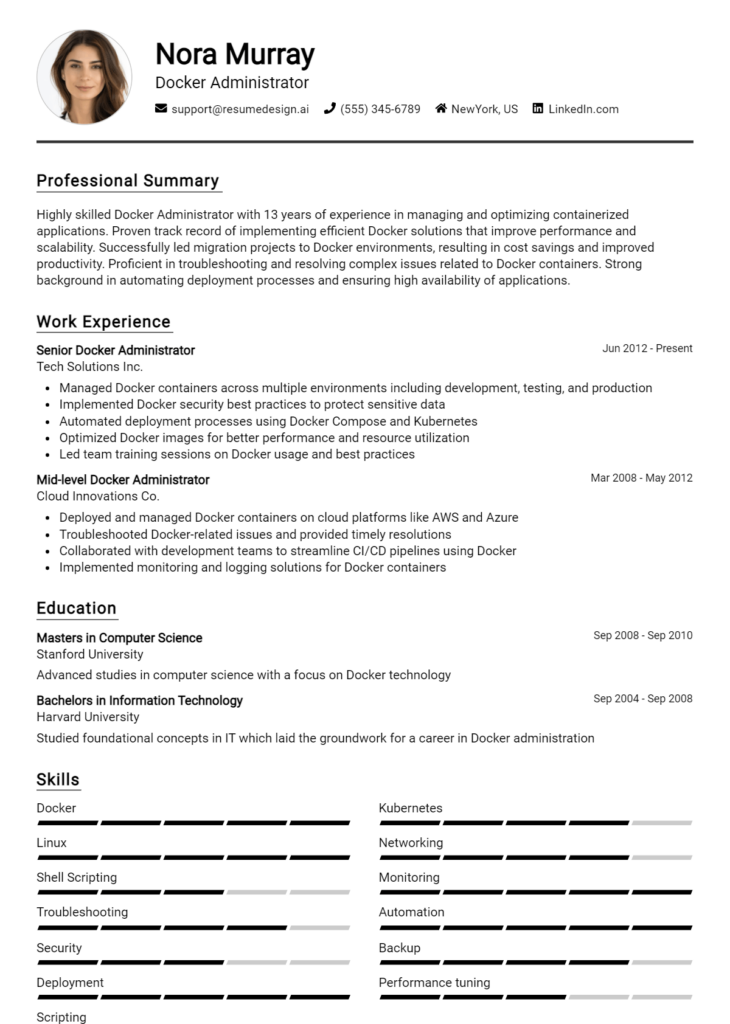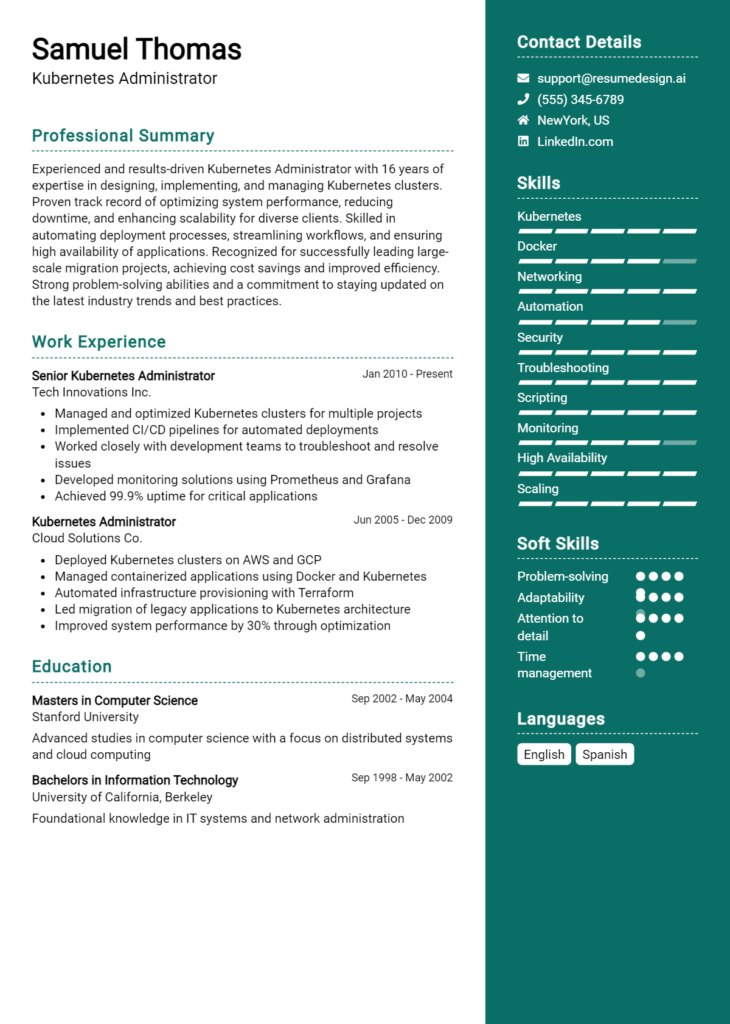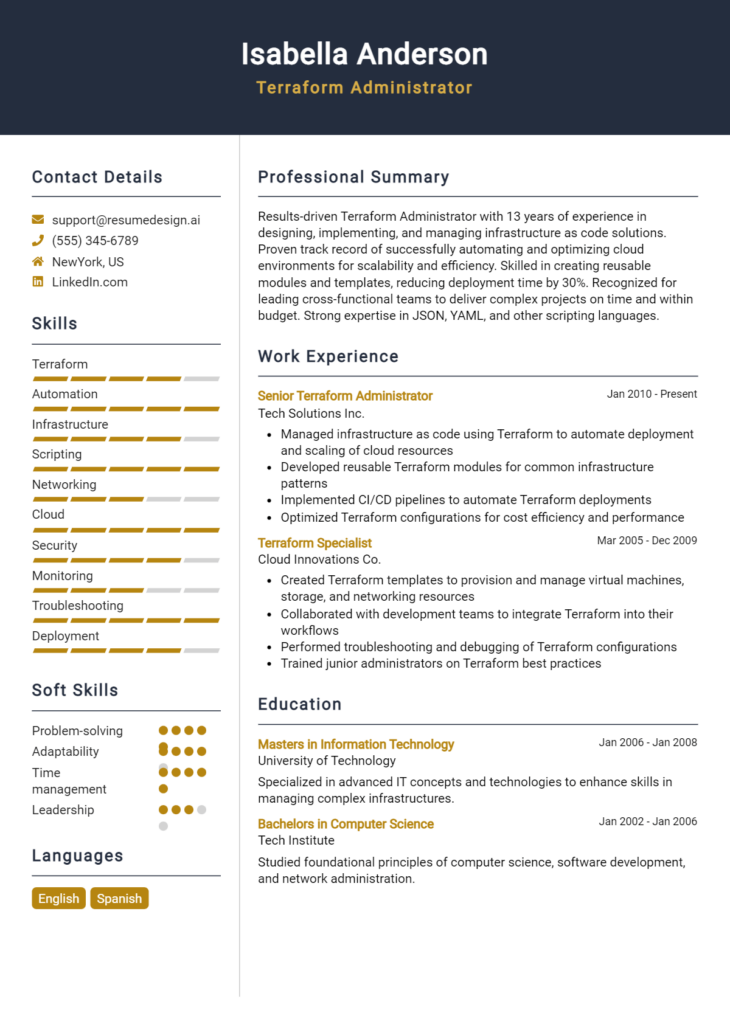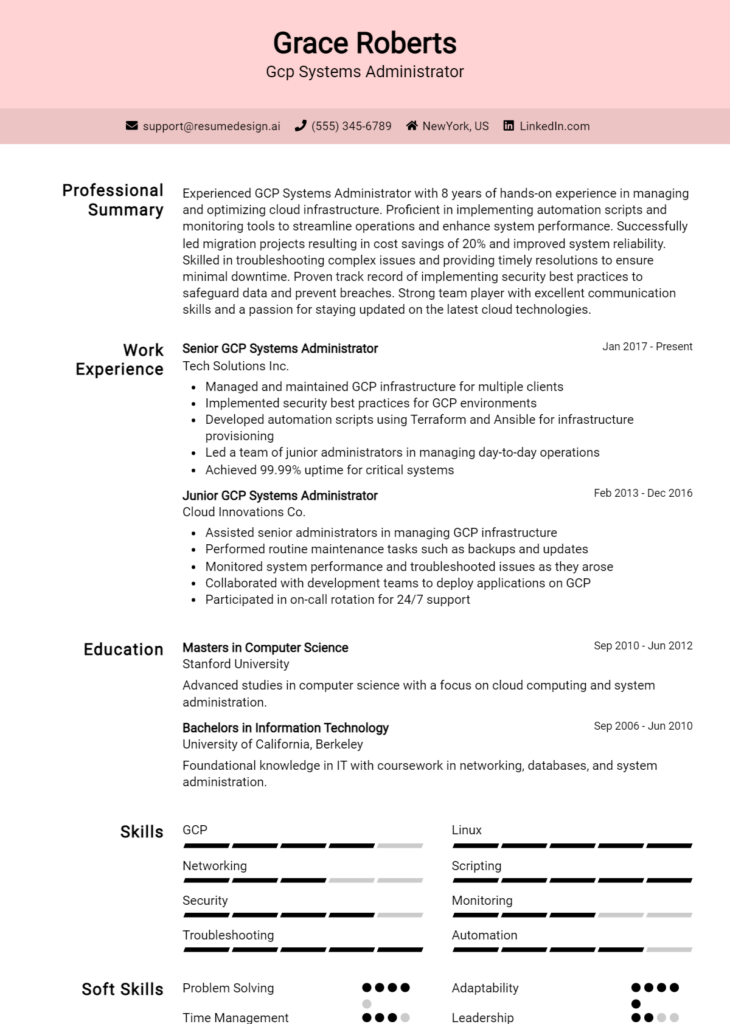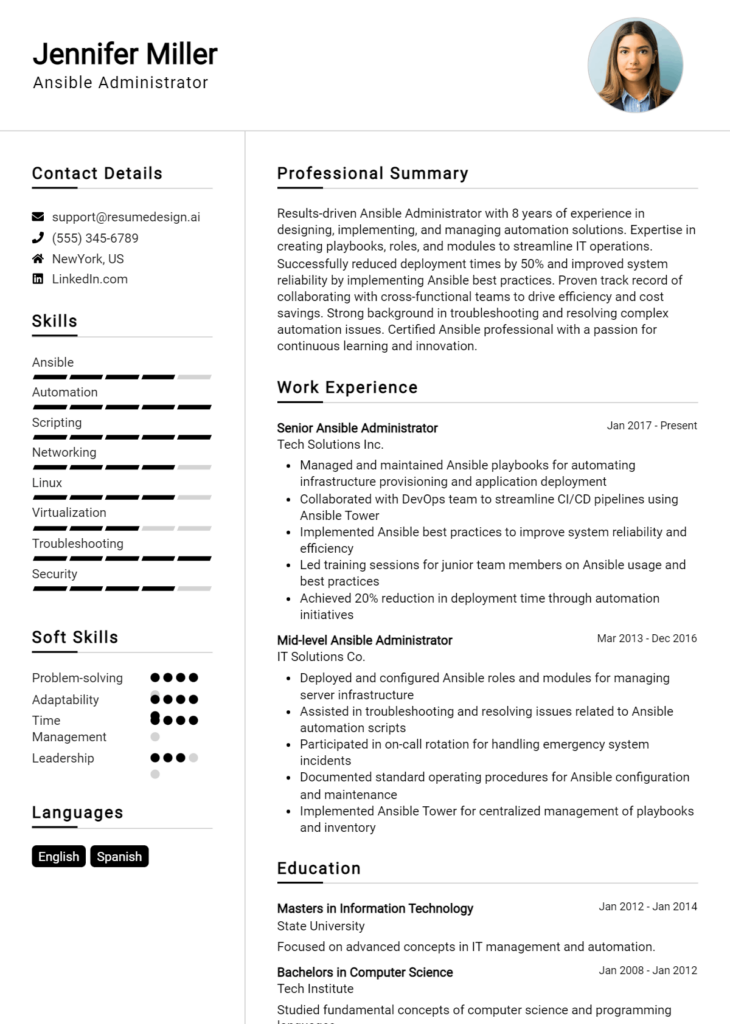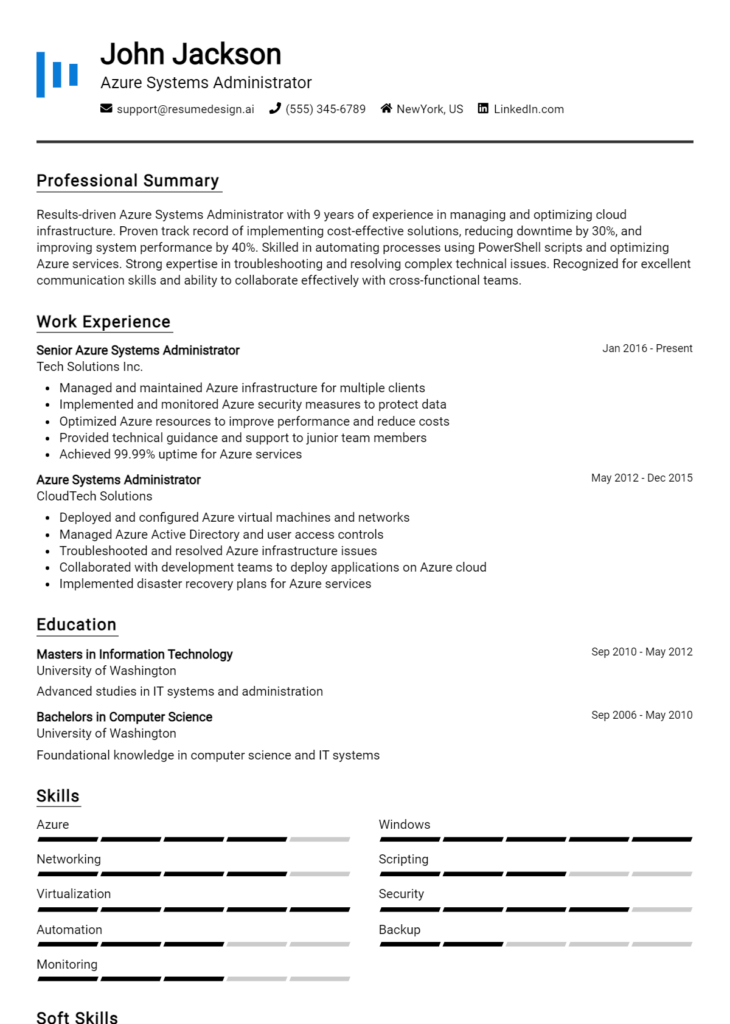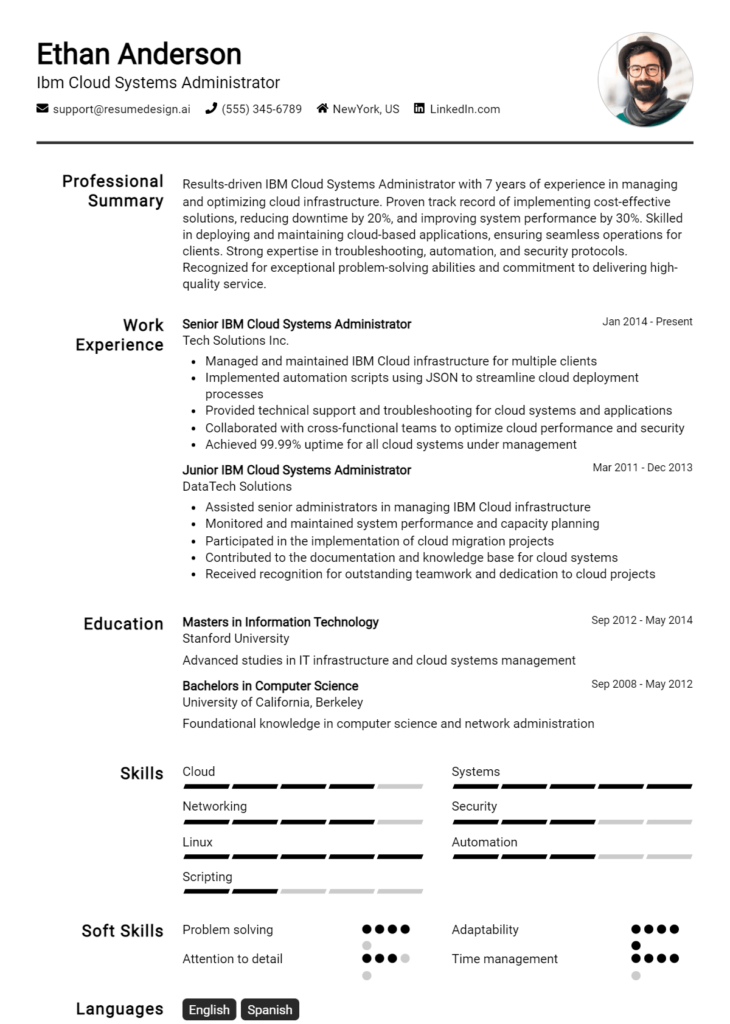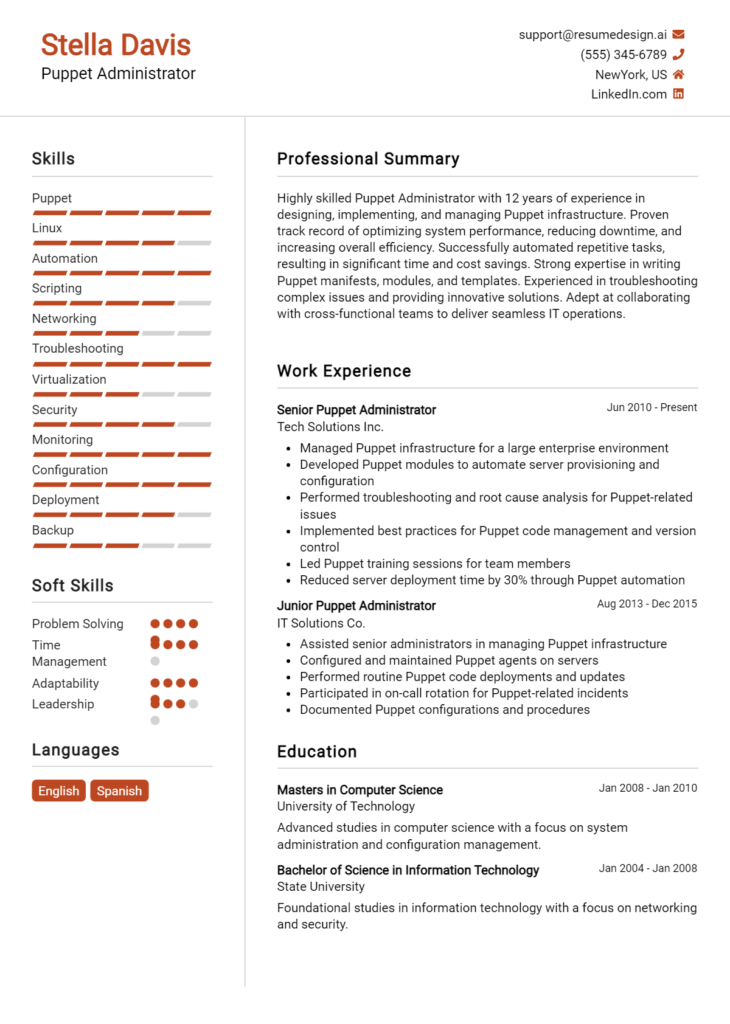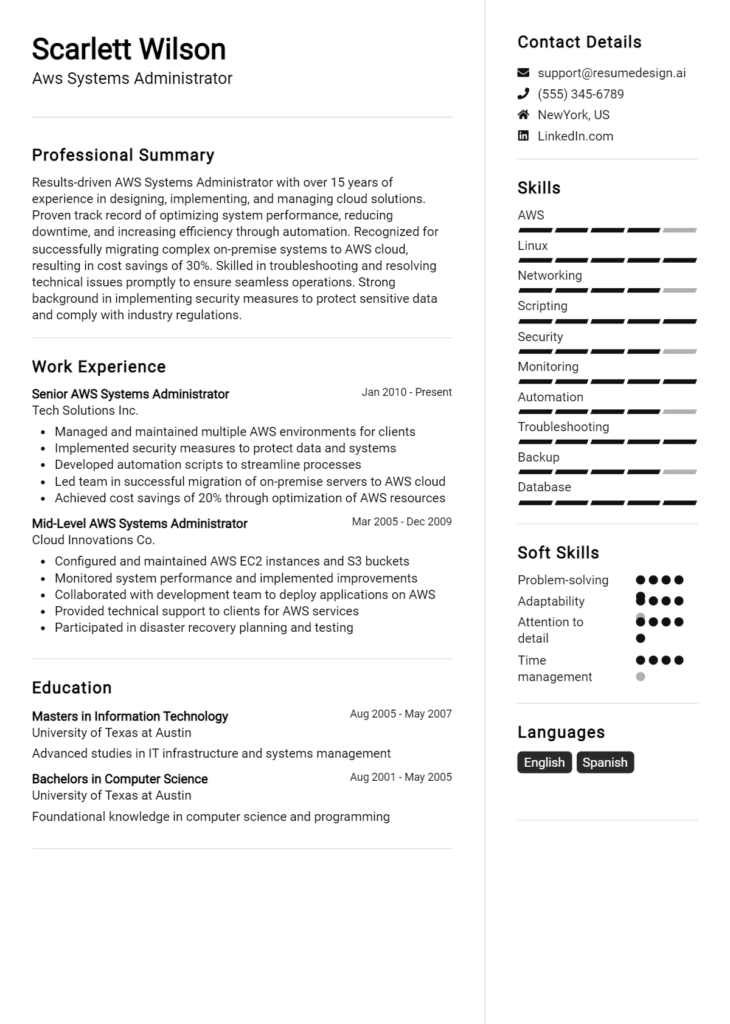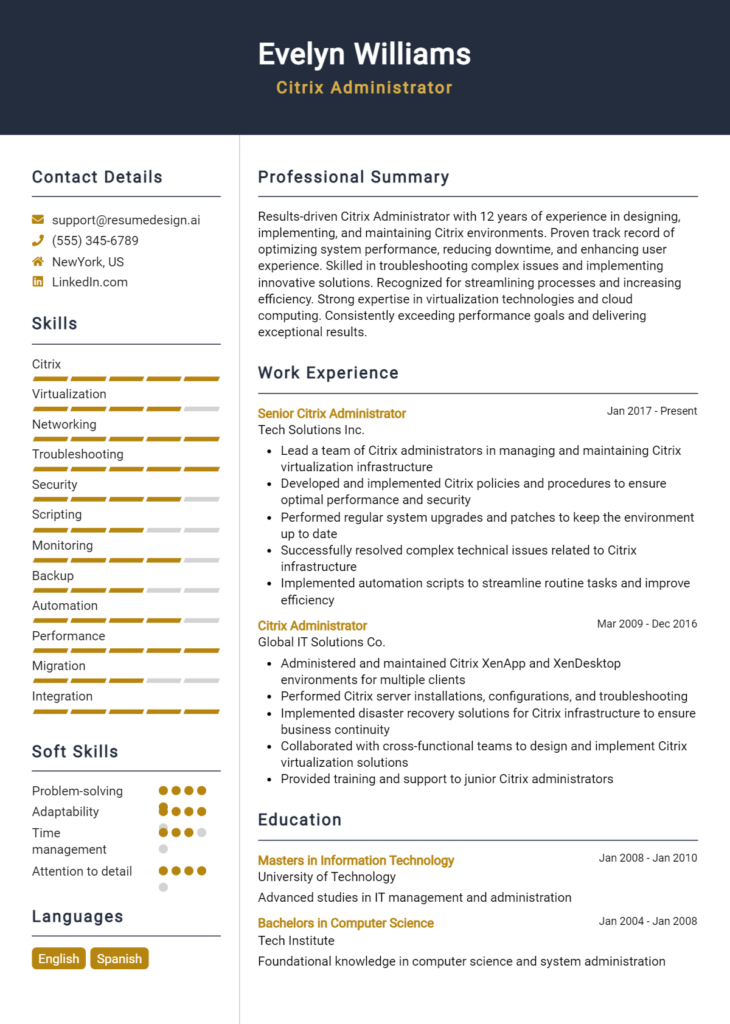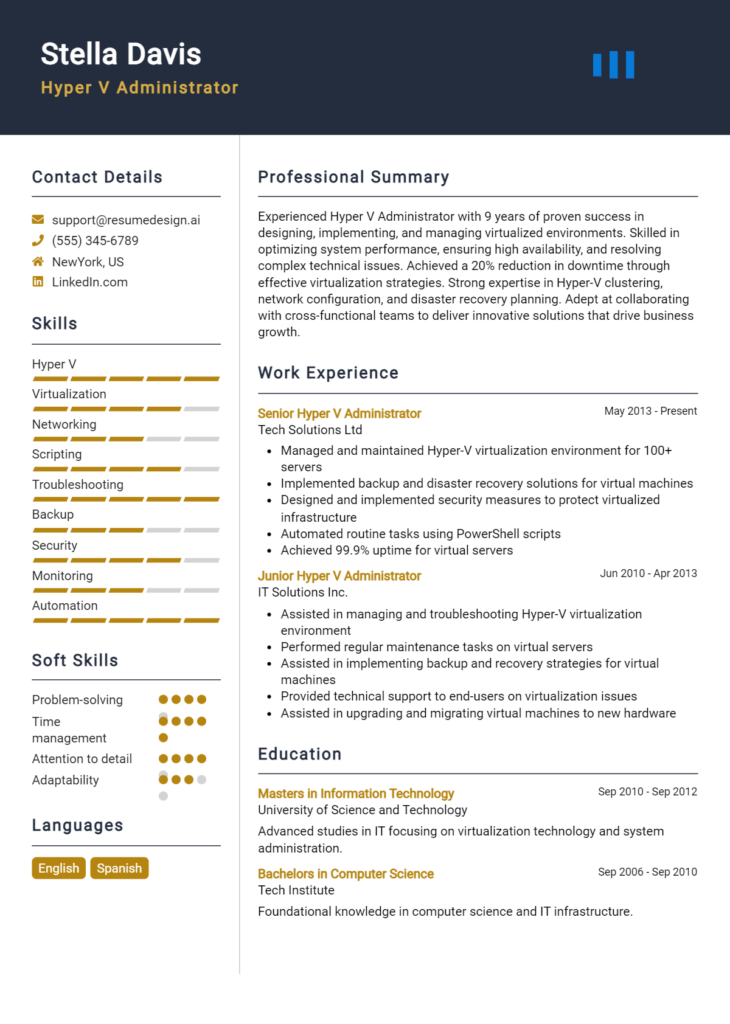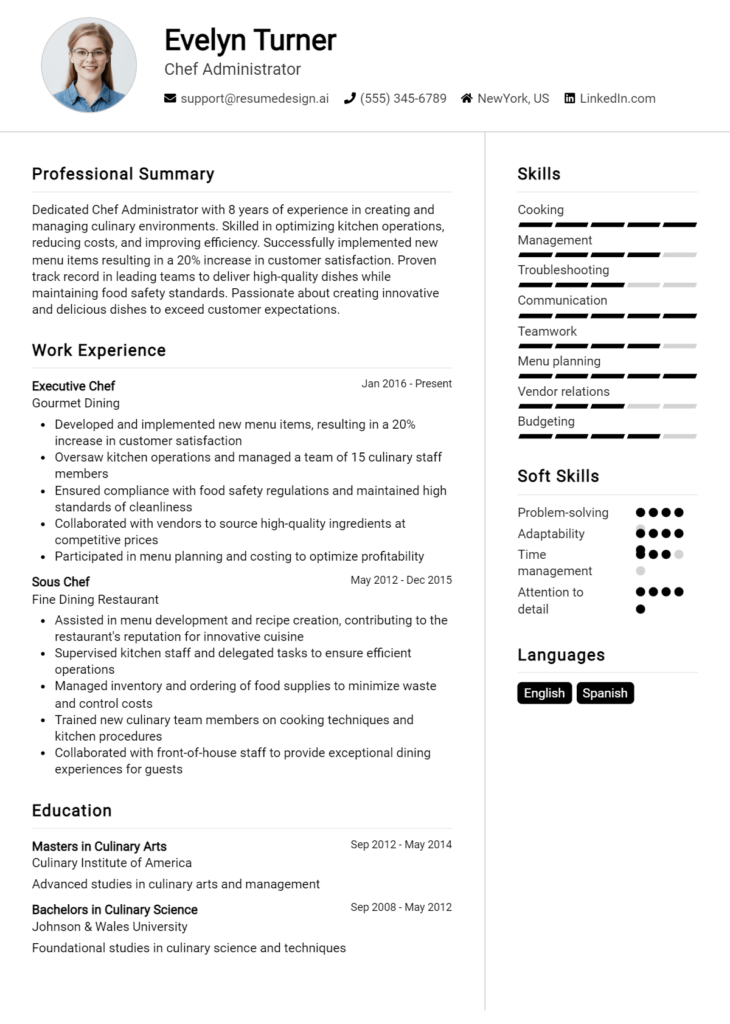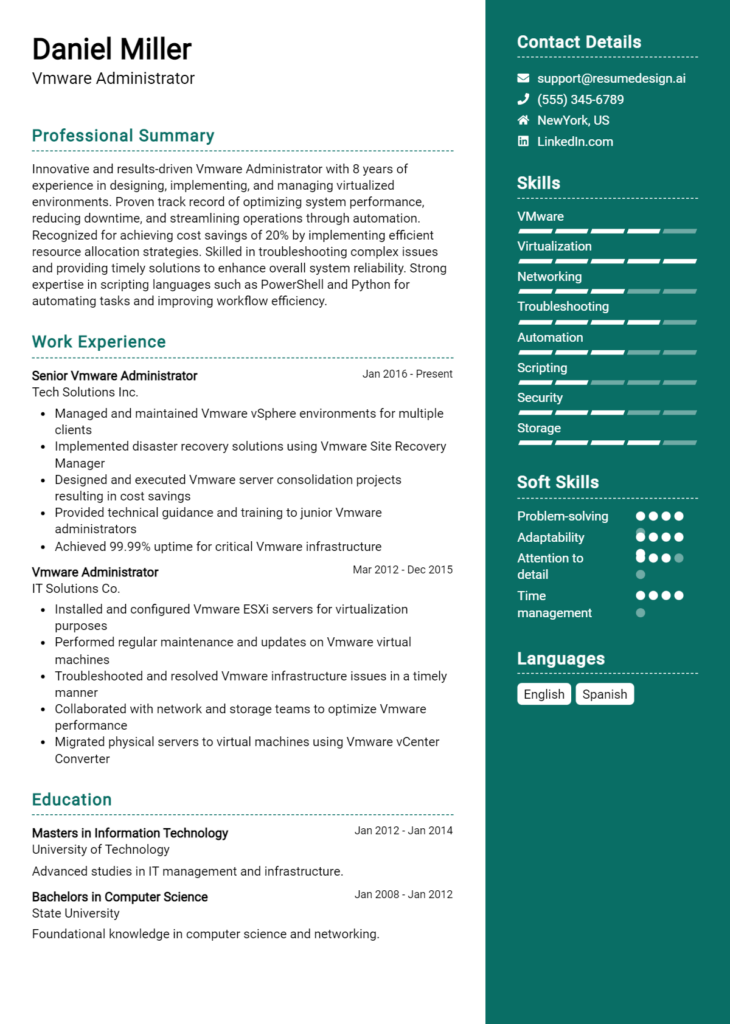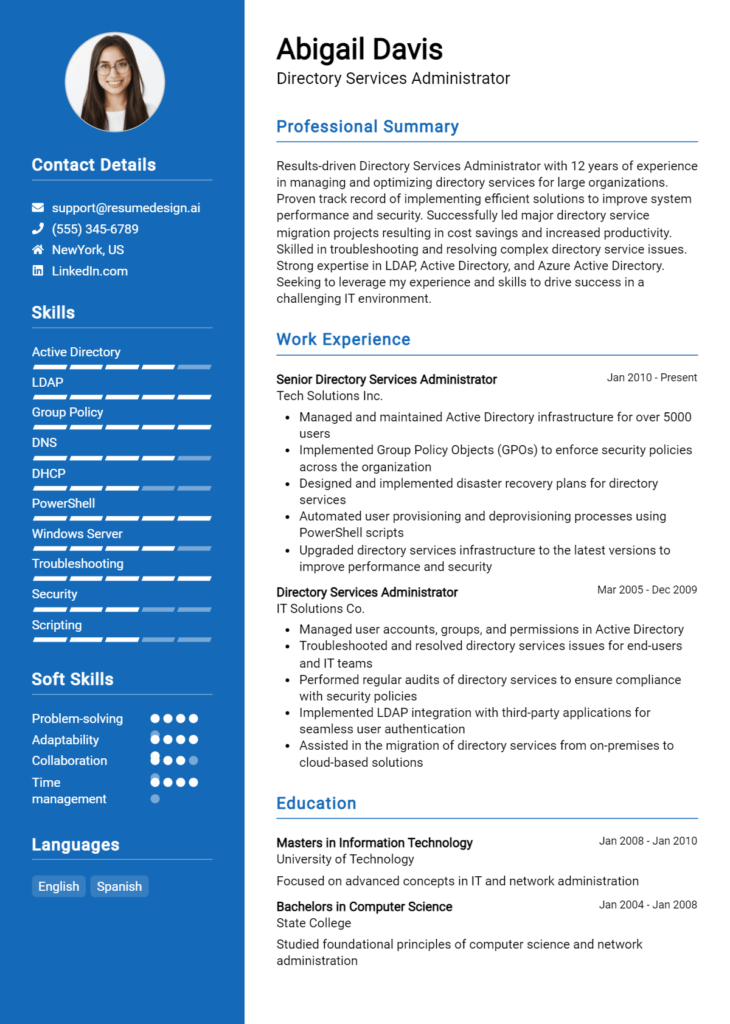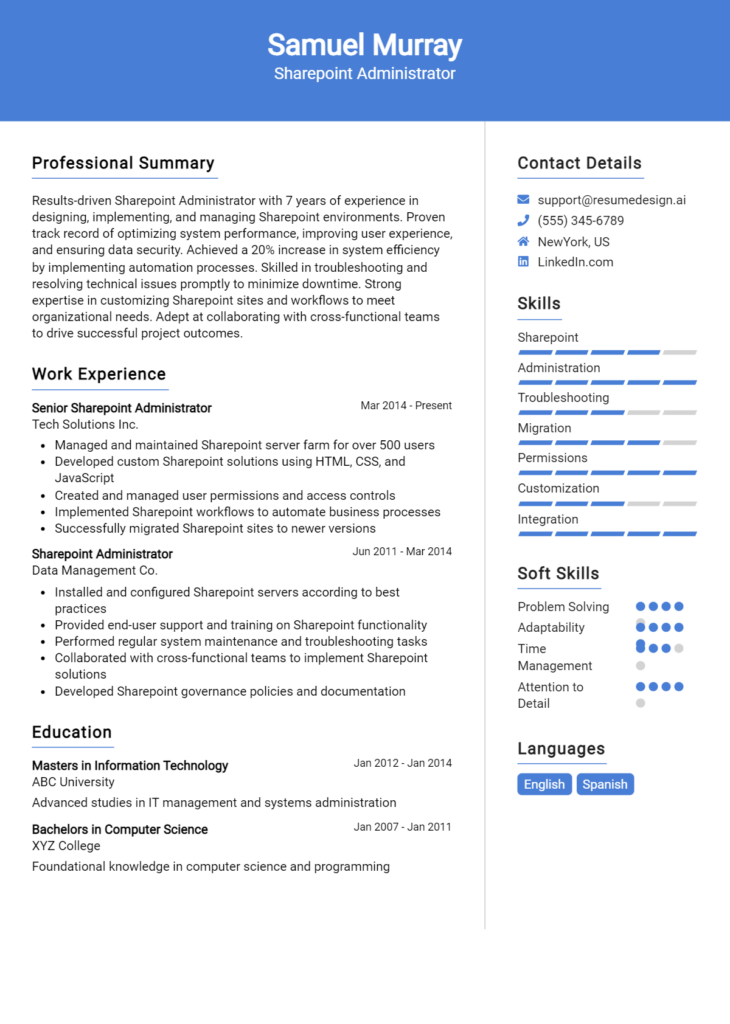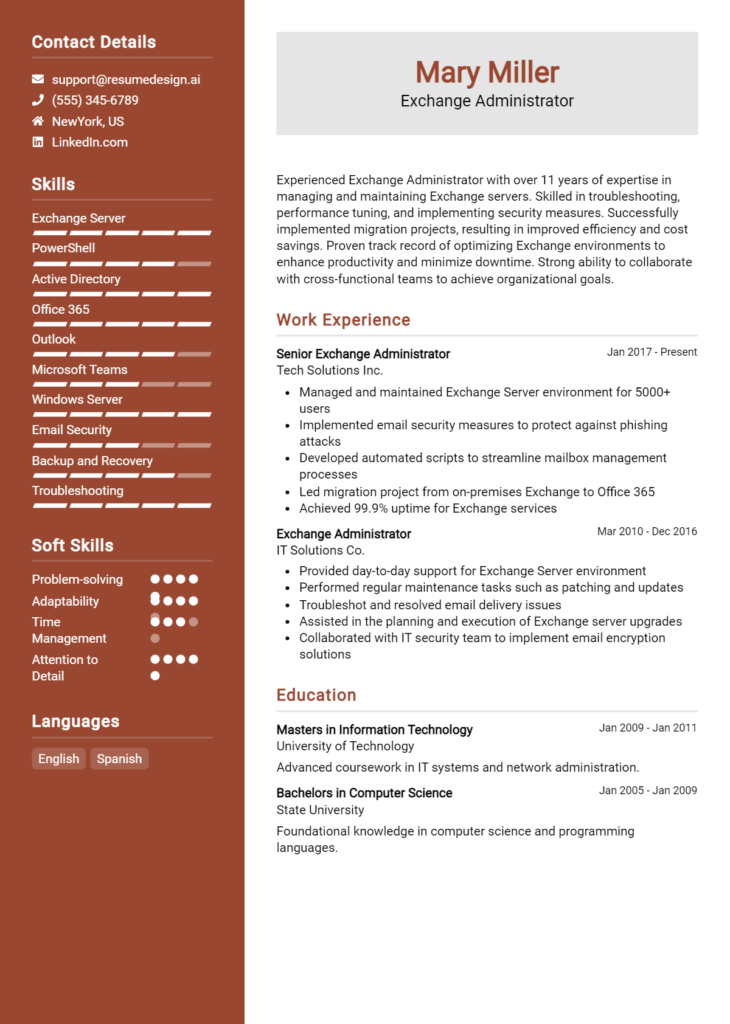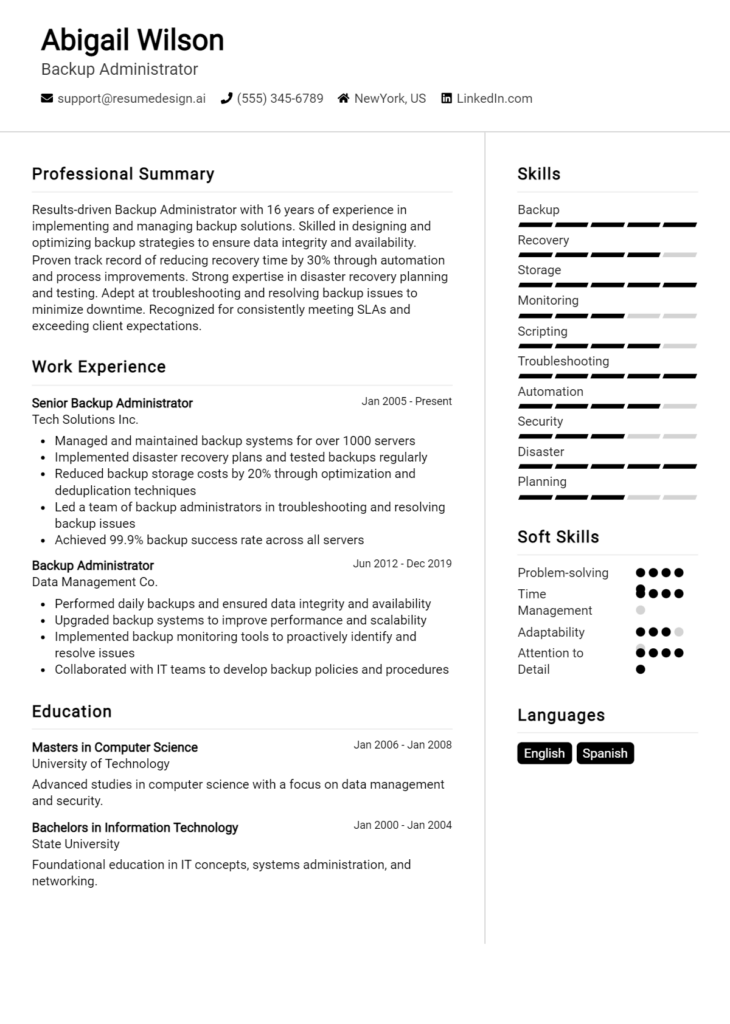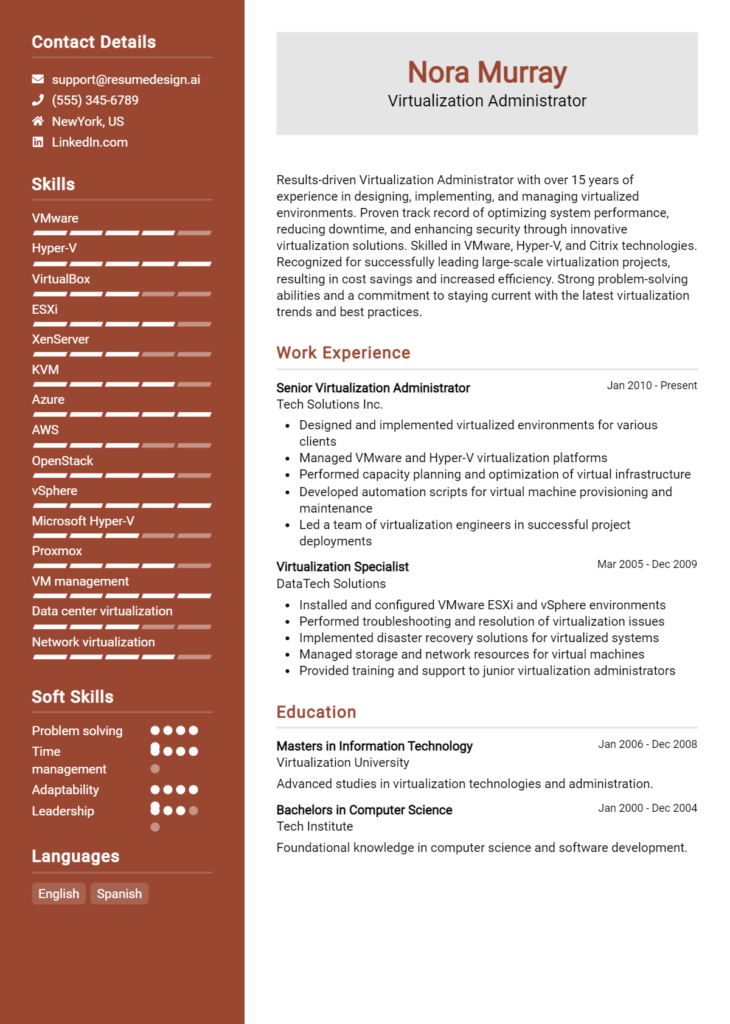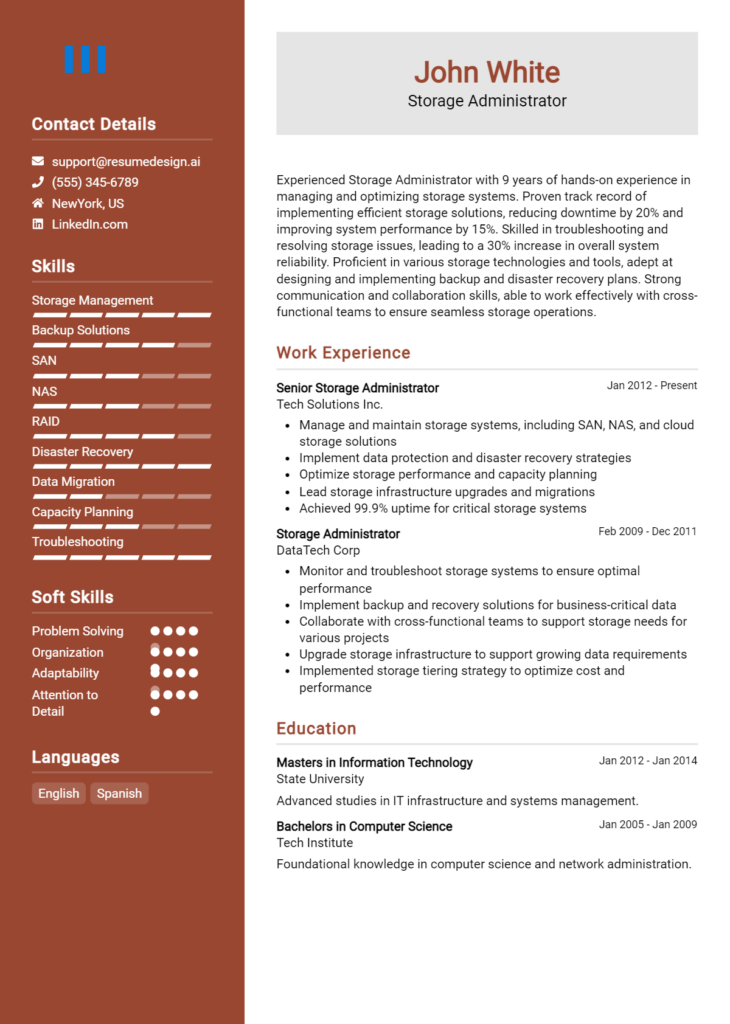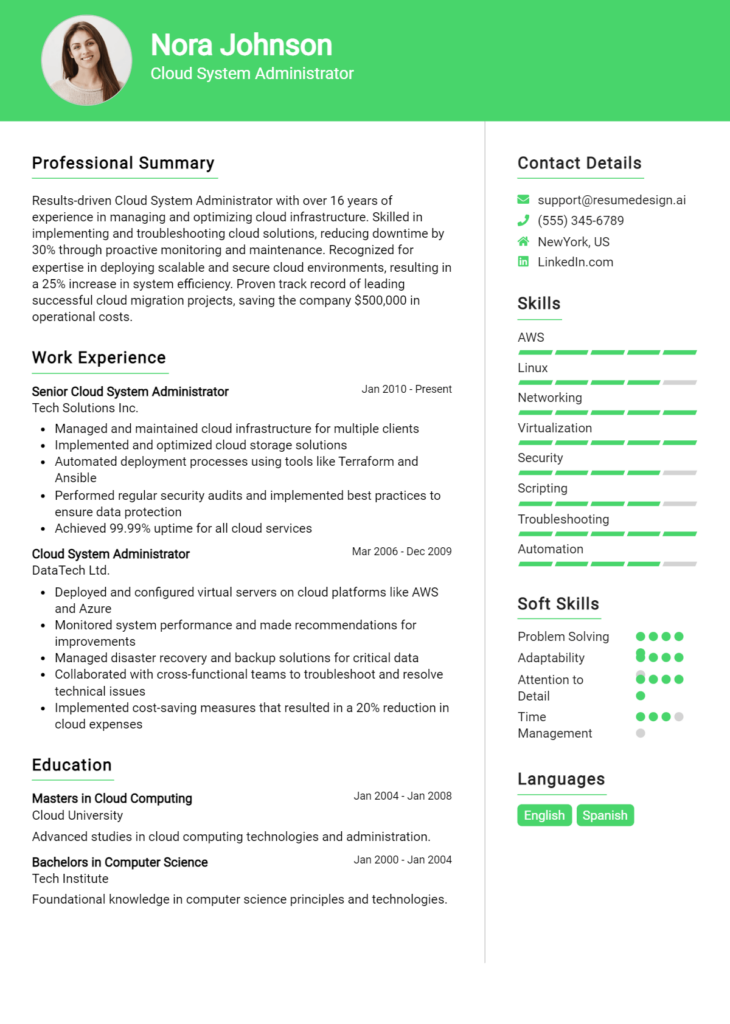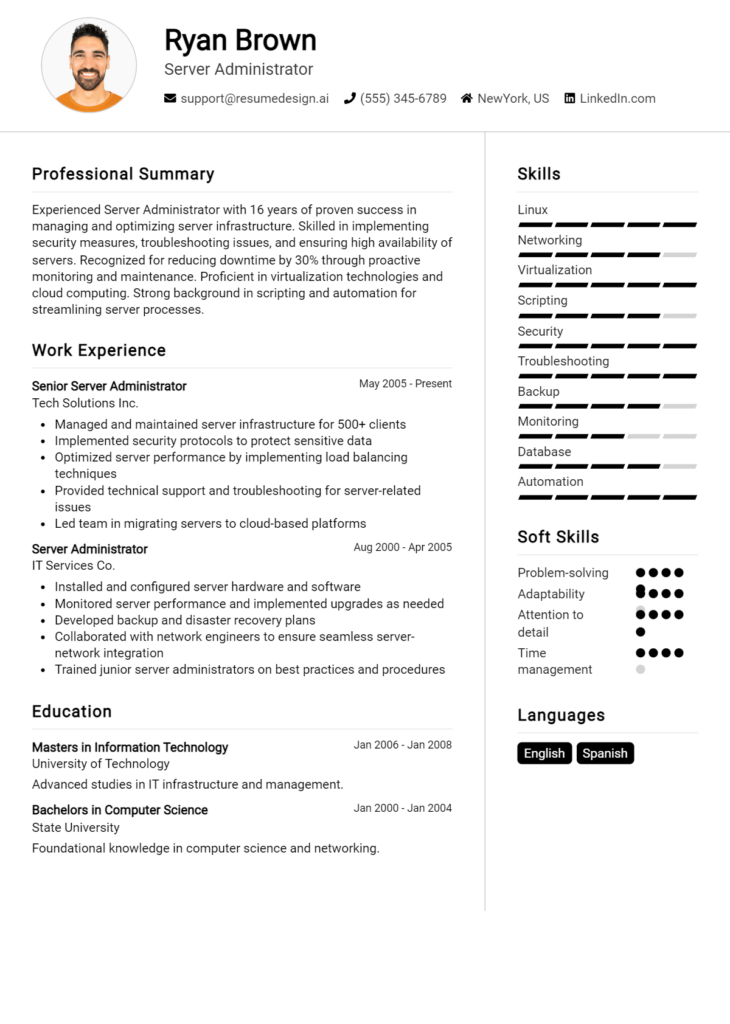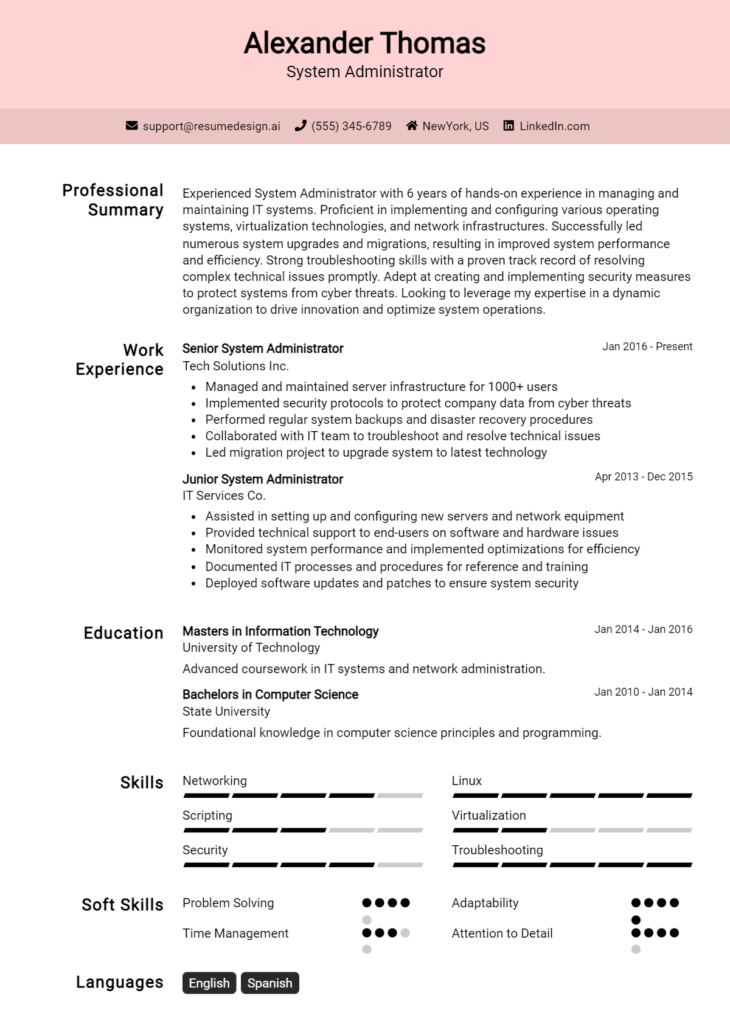Database Administrator Core Responsibilities
A Database Administrator (DBA) is crucial for managing, securing, and optimizing an organization’s databases, ensuring data integrity and availability across various departments. Key responsibilities include database design, performance tuning, and troubleshooting complex issues. Successful DBAs possess strong technical skills in SQL, operational knowledge of database management systems, and excellent problem-solving abilities. By bridging the gap between IT and other business functions, they contribute significantly to organizational goals. A well-structured resume effectively highlights these competencies, showcasing their value to potential employers.
Common Responsibilities Listed on Database Administrator Resume
- Designing and implementing database structures.
- Monitoring database performance and optimizing queries.
- Ensuring data security and compliance with regulations.
- Performing regular backups and disaster recovery planning.
- Troubleshooting database issues and implementing solutions.
- Collaborating with development teams for application support.
- Managing database access and user permissions.
- Conducting capacity planning and resource allocation.
- Documenting database configurations and procedures.
- Staying updated on industry trends and database technologies.
- Providing training and support to end-users.
High-Level Resume Tips for Database Administrator Professionals
In today's competitive job market, a well-crafted resume serves as a crucial tool for Database Administrator professionals seeking to stand out to potential employers. Your resume is often the first impression you make, and it needs to effectively reflect not only your technical skills and expertise but also your achievements and the value you can bring to an organization. A compelling resume can showcase your capabilities in managing database systems, optimizing performance, and ensuring data integrity, making it essential for capturing the attention of hiring managers. This guide will provide practical and actionable resume tips specifically tailored for Database Administrator professionals, helping you to present your qualifications in the most impactful way.
Top Resume Tips for Database Administrator Professionals
- Tailor your resume to the specific job description, using keywords and phrases that align with the employer's requirements.
- Highlight relevant experience by detailing your past roles and responsibilities related to database management and administration.
- Quantify your achievements with metrics, such as improved database performance percentages or reduced downtime, to demonstrate your impact.
- Showcase industry-specific skills, including proficiency in database systems like SQL Server, Oracle, or MySQL, and any relevant certifications.
- Include a dedicated skills section that lists both technical and soft skills, such as problem-solving, attention to detail, and teamwork.
- Utilize action verbs to describe your accomplishments, such as "administered," "optimized," and "implemented," to convey proactivity.
- Keep the formatting clean and professional, ensuring easy readability with clear section headings and bullet points.
- Incorporate a summary statement at the top of your resume that encapsulates your experience, skills, and career goals as a Database Administrator.
- Proofread your resume thoroughly to eliminate any spelling or grammatical errors that could undermine your professionalism.
By implementing these tips, you can significantly enhance your resume and increase your chances of landing a job in the Database Administrator field. A focused and polished resume will not only highlight your strengths but also demonstrate your commitment to excellence, making you a more attractive candidate to potential employers.
Why Resume Headlines & Titles are Important for Database Administrator
In the competitive field of database administration, a well-crafted resume headline or title is crucial for making a strong first impression on hiring managers. A powerful headline can immediately capture attention, succinctly summarizing a candidate's key qualifications and setting the tone for the rest of the resume. By distilling essential skills, experiences, and achievements into a concise phrase, candidates can effectively communicate their suitability for the role they are applying for. This strategic approach not only enhances visibility but also ensures that the resume stands out from the multitude of applications, ultimately increasing the chances of landing an interview.
Best Practices for Crafting Resume Headlines for Database Administrator
- Keep it concise: Aim for a headline that is brief yet informative, ideally one sentence or phrase.
- Be role-specific: Tailor the headline to reflect the specific database administrator position you are applying for.
- Highlight key skills: Incorporate critical technical skills or certifications relevant to database administration.
- Emphasize accomplishments: Include notable achievements that demonstrate your expertise and value.
- Use strong action words: Start with compelling verbs that convey confidence and proactivity.
- Avoid jargon: Use clear language that can be easily understood by HR personnel, not just technical staff.
- Match job descriptions: Align your headline with the keywords and phrases found in the job listing.
- Update regularly: Revise your headline for each application to ensure it remains relevant and impactful.
Example Resume Headlines for Database Administrator
Strong Resume Headlines
"Certified Database Administrator with 5+ Years of Experience in SQL and Performance Optimization"
“Expert in Data Security and Backup Solutions for High-Volume Database Environments”
"Results-Driven Database Administrator Specializing in Cloud-Based Database Management"
“Dynamic Database Professional with Proven Track Record in System Upgrades and Migrations”
Weak Resume Headlines
“Database Administrator Looking for a Job”
“IT Professional with Computer Skills”
The strong headlines are effective because they are specific, outcome-oriented, and clearly outline the candidate's expertise in database administration. They incorporate relevant skills and experiences that align with the role, making it easy for hiring managers to see the value the candidate brings. In contrast, the weak headlines fail to impress due to their vagueness and lack of relevant detail. They do not convey any unique strengths or qualifications, making it difficult for employers to understand what the candidate can offer and why they should be considered for the position.
Writing an Exceptional Database Administrator Resume Summary
A well-crafted resume summary is a crucial component for any Database Administrator seeking to stand out in a competitive job market. This brief yet impactful section serves as an introduction to your qualifications, quickly capturing the attention of hiring managers. A strong summary effectively highlights key skills, relevant experience, and notable accomplishments tailored to the specific job role. By presenting a concise overview of your expertise, you provide potential employers with a compelling reason to delve deeper into your resume, making it essential to get this element right.
Best Practices for Writing a Database Administrator Resume Summary
- Quantify Achievements: Use specific numbers to demonstrate your impact, such as the size of databases managed or percentage improvements in performance.
- Focus on Relevant Skills: Highlight essential skills such as database design, performance tuning, or backup and recovery strategies that align with the job description.
- Tailor to the Job Description: Customize your summary to reflect the requirements and preferences stated in the job posting.
- Be Concise: Aim for 2-4 sentences that succinctly convey your qualifications without unnecessary jargon.
- Showcase Certifications: If you have relevant certifications (e.g., Oracle, Microsoft SQL Server), mention them to enhance credibility.
- Highlight Problem-Solving Abilities: Emphasize your experience in troubleshooting and resolving database-related issues effectively.
- Use Action Verbs: Start sentences with strong action verbs to convey your contributions dynamically.
- Maintain Professional Tone: Ensure the summary is professional and free from grammatical errors to make a lasting impression.
Example Database Administrator Resume Summaries
Strong Resume Summaries
Detail-oriented Database Administrator with over 7 years of experience optimizing database performance, resulting in a 30% reduction in downtime across critical systems. Proficient in SQL Server and Oracle, with a proven track record of implementing robust backup and recovery strategies that have improved data integrity by 25%.
Results-driven Database Administrator with expertise in managing large-scale databases for e-commerce platforms. Successfully migrated over 500TB of data to a new architecture, enhancing system efficiency by 40% and reducing query response time by 50%.
Skilled Database Administrator with 5+ years in designing and implementing scalable database solutions. Led a team that executed a project to upgrade the database infrastructure, which increased transaction processing speed by 35% and improved overall user satisfaction ratings.
Weak Resume Summaries
Experienced Database Administrator looking for a new opportunity to utilize my skills.
Database professional with knowledge in various database systems and a desire to contribute to a team.
The examples of strong resume summaries are effective because they are specific and quantify achievements, showcasing the candidate's direct impact on previous roles. They highlight relevant skills and experiences that align with the responsibilities of a Database Administrator. In contrast, the weak summaries lack detail and specificity, making them generic and unmemorable. They fail to convey any measurable impact or unique qualifications, which can leave hiring managers unimpressed.
Work Experience Section for Database Administrator Resume
The work experience section of a Database Administrator resume is crucial as it serves as a testament to the candidate's technical skills and ability to oversee complex database environments. This section allows candidates to demonstrate their expertise in database management, project leadership, and their capacity to deliver high-quality solutions that meet organizational needs. By quantifying achievements and aligning experiences with industry standards, candidates can effectively convey their value to potential employers, showcasing not only their technical skills but also their contributions to team dynamics and project outcomes.
Best Practices for Database Administrator Work Experience
- Highlight specific database technologies and tools used, such as SQL, Oracle, or NoSQL databases.
- Use metrics to quantify achievements, such as improved performance percentages or reduced downtime hours.
- Include examples of successful project leadership and collaboration with cross-functional teams.
- Demonstrate problem-solving skills by detailing challenges faced and solutions implemented.
- Align experience descriptions with industry standards and best practices.
- Focus on continuous learning and certifications relevant to database management.
- Showcase contributions to data security and compliance initiatives.
- Emphasize any mentoring or training roles taken on within teams.
Example Work Experiences for Database Administrator
Strong Experiences
- Led a team in migrating a legacy database system to a cloud-based solution, resulting in a 30% reduction in operational costs and improved system reliability.
- Optimized database queries that decreased data retrieval time by 45%, enhancing user experience for over 10,000 active users.
- Implemented a comprehensive backup and disaster recovery plan that reduced data loss risk by 80%, ensuring business continuity.
- Collaborated with software development teams to design and integrate a new database schema, improving application performance by 25% through efficient data management.
Weak Experiences
- Responsible for maintaining databases and ensuring they run smoothly.
- Worked on various database projects without specifying details or outcomes.
- Assisted in some database migrations and updates.
- Participated in team meetings to discuss database issues.
The examples of strong experiences are characterized by specific, quantifiable outcomes that demonstrate the candidate's technical expertise and leadership abilities. They highlight successful project outcomes and contributions to team efforts. In contrast, the weak experiences lack specificity and measurable results, which diminishes their impact and fails to convey the candidate's true capabilities in the role of a Database Administrator.
Education and Certifications Section for Database Administrator Resume
The education and certifications section of a Database Administrator resume is crucial for showcasing a candidate's academic background and professional qualifications. This section not only highlights relevant degrees and specialized training but also emphasizes the importance of industry-recognized certifications that demonstrate a commitment to continuous learning and professional development. By presenting pertinent coursework, certifications, and ongoing education efforts, candidates can significantly enhance their credibility and align themselves with the specific requirements of the job role they are pursuing.
Best Practices for Database Administrator Education and Certifications
- Prioritize relevant degrees, such as Computer Science, Information Technology, or Database Management.
- Include industry-recognized certifications, such as Microsoft Certified: Azure Database Administrator Associate or Oracle Database Administrator Certified Professional.
- Provide details on specialized training in database technologies, such as SQL, NoSQL, or cloud-based databases.
- Highlight any relevant coursework that focuses on database design, data modeling, or performance tuning.
- Keep the section updated with the latest certifications to reflect ongoing professional development.
- Use clear and concise language to describe qualifications, avoiding jargon that may confuse recruiters.
- Organize the section in reverse chronological order to showcase the most recent and relevant qualifications first.
- Tailor the content to the job description by aligning qualifications with the skills and technologies mentioned in the role.
Example Education and Certifications for Database Administrator
Strong Examples
- Bachelor of Science in Computer Science, XYZ University
- Microsoft Certified: Azure Database Administrator Associate
- Oracle Certified Professional, MySQL 5.7 Database Administrator
- Relevant Coursework: Database Design, Data Warehousing, and Advanced SQL
Weak Examples
- Associate Degree in General Studies
- Certification in Basic Computer Skills (outdated)
- Bachelor of Arts in English Literature
- Coursework in Creative Writing and Art History
The strong examples are considered effective because they directly relate to the skills and knowledge required for a Database Administrator role. They include relevant degrees, recognized certifications, and coursework that aligns with industry standards. Conversely, the weak examples lack relevance to the position, showcasing degrees and certifications that do not contribute to the candidate's qualifications in database management or administration. This distinction emphasizes the importance of aligning educational background and certifications with the specific demands of the job role.
Top Skills & Keywords for Database Administrator Resume
As a Database Administrator (DBA), possessing the right skills is crucial for effectively managing and maintaining an organization's database systems. A well-crafted resume that highlights both hard and soft skills can significantly enhance a candidate's chances of landing an interview. Hard skills demonstrate technical expertise, while soft skills showcase interpersonal abilities, teamwork, and problem-solving capabilities. Together, these skills form a comprehensive profile that reflects a DBA's qualifications and readiness to handle complex database environments.
Top Hard & Soft Skills for Database Administrator
Soft Skills
- Problem-solving
- Attention to detail
- Communication
- Time management
- Team collaboration
- Adaptability
- Critical thinking
- Project management
- Customer service orientation
- Conflict resolution
Hard Skills
- Database management systems (e.g., MySQL, Oracle, SQL Server)
- SQL programming and queries
- Backup and recovery techniques
- Performance tuning and optimization
- Data modeling and design
- Security protocols and data encryption
- Data warehousing and ETL processes
- Cloud database management (e.g., AWS, Azure)
- Scripting languages (e.g., Python, Bash)
- Monitoring and troubleshooting tools
For more insights into how to present your skills effectively, and to understand the importance of showcasing your work experience, consider exploring additional resources that can enhance your resume.
Stand Out with a Winning Database Administrator Cover Letter
I am writing to express my interest in the Database Administrator position at [Company Name], as advertised on [Job Board/Company Website]. With over [X years] of experience in database management and a strong commitment to optimizing data storage and retrieval processes, I am confident in my ability to contribute effectively to your team. My extensive knowledge of various database management systems, including SQL Server, MySQL, and Oracle, paired with my analytical skills, allows me to ensure data integrity and performance optimization.
In my previous role at [Previous Company Name], I successfully managed a large-scale database that supported critical business operations. I implemented effective backup and recovery solutions, reducing the risk of data loss by [X%]. Additionally, I collaborated with cross-functional teams to design and maintain efficient database architectures, which improved query performance and reduced transaction times. My proactive approach to monitoring database performance and troubleshooting issues minimizes downtime and enhances user satisfaction.
I am particularly drawn to the opportunity at [Company Name] because of your commitment to innovation and excellence in data management. I am eager to bring my expertise in database security and compliance to ensure that your data remains both accessible and protected. Furthermore, I thrive in environments that foster collaboration and continuous improvement, and I am excited about the prospect of working alongside a talented team dedicated to achieving organizational goals.
Thank you for considering my application. I look forward to the opportunity to discuss how my skills and experiences align with the needs of your team. I am enthusiastic about the chance to contribute to [Company Name] and help drive the success of your database initiatives.
Common Mistakes to Avoid in a Database Administrator Resume
When crafting a resume for a Database Administrator position, it's crucial to present your skills and experiences in a clear and compelling manner. However, many candidates inadvertently make common mistakes that can undermine their chances of landing an interview. Understanding these pitfalls can help you create a more effective resume that stands out to potential employers. Below are some of the most frequent errors to watch out for:
Using Generic Job Descriptions: Simply listing responsibilities without tailoring them to the specific DBA role can make your resume blend in with others. Instead, highlight achievements and specific technologies relevant to the job.
Neglecting Technical Skills: Failing to showcase key technical skills such as SQL, database design, and performance tuning can lead to missed opportunities. Ensure your skills section is comprehensive and reflects the requirements of the position.
Inconsistent Formatting: A resume that lacks a uniform format can be distracting and look unprofessional. Stick to a consistent font, size, and style throughout to ensure readability.
Overloading with Jargon: While technical terminology is essential, using too much jargon can alienate recruiters who may not be familiar with every term. Balance technical language with clear explanations.
Inadequate Metrics: Not including quantifiable achievements can weaken your resume. Use metrics to demonstrate the impact of your work, such as improved database performance, reduced downtime, or successful migrations.
Ignoring Soft Skills: Focusing solely on technical skills can overlook important soft skills like problem-solving, communication, and teamwork. Highlight these attributes as they are crucial for collaboration and project management.
Not Including Relevant Certifications: Omitting certifications such as Oracle Certified Professional or Microsoft Certified Database Administrator can diminish your credibility. List relevant certifications to bolster your qualifications.
Failing to Proofread: Typos and grammatical errors can create a negative impression and suggest a lack of attention to detail. Always proofread your resume or ask someone else to review it before submission.
Conclusion
In conclusion, the role of a Database Administrator (DBA) is essential in managing and securing the data that organizations rely on to function effectively. Throughout the article, we explored the key responsibilities of a DBA, including database design, performance tuning, backup and recovery, and ensuring data integrity and security. We also highlighted the importance of staying updated with the latest technologies and best practices in the field.
As you reflect on your career as a Database Administrator, it's crucial to present your skills and experience in the best light possible. A well-crafted resume is your first step toward landing your dream job. We encourage you to take the time to review your Database Administrator resume and ensure it showcases your qualifications effectively.
To assist you in this process, consider utilizing various resources available online. Check out the resume templates to find a design that suits your style, or use the resume builder to create a professional and polished resume that highlights your expertise. Additionally, you can browse through resume examples for inspiration and tailor your document to meet the specific needs of potential employers. Don’t forget to complement your resume with a strong application by utilizing cover letter templates that can help you convey your passion for the role.
Take action now and refine your resume to reflect your skills as a Database Administrator. Your next opportunity awaits!

